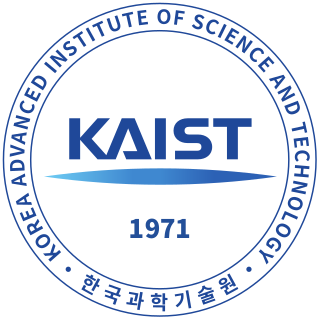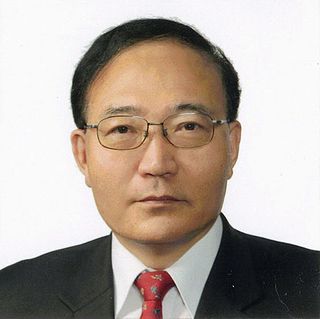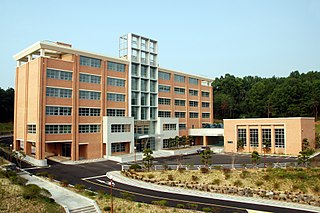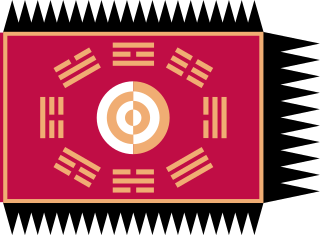
KAIST is a national research university located in Daedeok Innopolis, Daejeon, South Korea. KAIST was established by the Korean government, with the help of American policymakers, in 1971 as the nation's first research-oriented science and engineering institution. KAIST also has been internationally accredited in business education, and hosting the Secretariat of AAPBS. KAIST has approximately 10,200 full-time students and 1,140 faculty researchers and had a total budget of US$765 million in 2013, of which US$459 million was from research contracts.

Legal education is the education of individuals in the principles, practices, and theory of law. It may be undertaken for several reasons, including to provide the knowledge and skills necessary for admission to legal practice in a particular jurisdiction, to provide a greater breadth of knowledge to those working in other professions such as politics or business, to provide current lawyers with advanced training or greater specialisation, or to update lawyers on recent developments in the law.

Hankuk University of Foreign Studies is a private research university based in Seoul, Republic of Korea. The university was founded in 1954 to promote foreign language education in post-war Korea. The university is located in Seoul and Yongin. The university has 60 departments and offers 53 different language courses. The name of the university is derived from the romanization of the Korean word Hankuk which means Korea. The university is considered one of the best private higher education institutions in South Korea, especially on foreign language and social science. It has a graduate school of interpretation and translation.
Yeungnam University is a private research university, located in Gyeongsan, North Gyeongsang, South Korea. The university's predecessors, Taegu College and Chunggu College, were founded in Daegu in 1947 and 1950 respectively. In 1967, the two colleges merged by President Park Chung-hee to form the degree-granting Yeungnam University. In 1972, the university's new main campus opened in Gyeongsan east of Daegu. The university includes colleges of Law and Medicine and a teaching hospital.

Kookmin University is the first private university after the liberation of the Republic of Korea from Japan. One of the prestigious school in Korea. The campus is located in Seongbuk-gu, Seoul, South Korea. The KU was established in 1946. Gu kim, Soang Jo and Ikhee Shin, who were the cabinet members of the Provisional Government of the Republic of Korea, agreed to train great leaders for the Republic of Korea. Soon, they became the banner of the Kookmin University. Ikhee Shin contributed to play a key role in its foundation, and was inaugurated as the First President of the University.
The University of Science and Technology (UST) is a group of public universities and research institutions in Seoul, Suwon, Changwon, Ansan, Seongnam and Daejeon, in South Korea. The UST was established in 2003 by the Ministry of Science, ICT and Future Planning as the nation’s graduate school specializing in science and engineering education and research. The UST runs only a graduate school. Creating the new driving force for growth would play a major role in leading national growth in the new century. The South Korean government established the UST to produce professionals in the field of combined technologies, thought of as one of the most important criteria for creating the driving force for South Korea's national growth. Today, UST continues to develop itself into a major research university.
Traditionally, Korean legal education followed the German and Japanese models. Recent reforms are shifting professional education from an undergraduate LL.B. to a postgraduate J.D. type of education. In addition, many Korean universities continue to offer legal education in academic and scholastic frameworks, offering graduate degrees, including Ph.D.s in Law. Further, several universities focus on legal systems outside of Korea, such as on Common Law.

Konkuk University Law School is one of the professional graduate schools of Konkuk University, formerly known as the College of Law. Located in Seoul, Republic of Korea, it is one of the 25 government approved law schools. It has the lowest student to faculty ratio in the country. It plans to specialize in real estates law and offers scholarship to all students. 50% of the students will receive half scholarship and the other 50% of the students will get full scholarship.
Hwang Jun-seok is a South Korean engineer. He currently serves as a Director and Dean of the Technology Management, Economics and Policy Program (TEMEP) and of the International Information Technology Policy Scholarship Program (ITPP) at the Seoul National University and Associate Professor at the Seoul National University.
Kangwon National University School of Law is one of the professional graduate schools of Kangwon National University(KNU). Located in Chuncheon, Republic of Korea, it is one of the 25 government approved law schools. It plans to specialize in environtmental law and offers scholarship to all eligible students.
Kyoung Jun Lee is a South Korean management professor. He is a professor of the School of Management at Kyung Hee University. He was a visiting professor at UC Berkeley from February to August 2010 and a visiting professor at the Massachusetts Institute of Technology, from September 2009 to January 2010.

Seoul National University of Science and Technology is a national university located in Nowon-gu, Seoul, South Korea.
Seoul Arts High School, also known by the abbreviation Yego is a private high school located in Pyeongchang-dong, Jongno-gu, Seoul.

Sohn Kyung-han is a defence attorney and law professor based in Seoul, South Korea. Sohn is a specialist in intellectual property law, international trade law, technology law, information society law, sports law, entertainment law and international arbitration. Sohn is president of the Korean Intellectual Property Society and the Korea Private International Law Association, and a law professor at Sungkyunkwan University.
Ajou Law School is one of the professional graduate schools of Ajou University, located in Suwon, South Korea. Founded in 2009, it is one of the founding law schools in South Korea and is one of the smaller schools with each class in the three-year J.D. program having approximately 50 students.
Chung-Ang Law School is one of the professional graduate schools of Chung-Ang University, located in Seoul, South Korea. Founded in 2009, it is one of the founding law schools in South Korea and is one of the smaller schools with each class in the three-year J.D. program having approximately 50 students.

Chungnam National University Law School is the professional graduate law school of Chungnam National University located in Daejeon, South Korea. Established in 2008, Chungnam Law is one of only twenty-five officially-accredited law schools of South Korea, only whose graduates can take unified bar examination of South Korea.
Wonyong Sung is a South Korean professor of electronic and information engineering at Seoul National University (SNU). Sung received his B.S. in engineering from SNU in 1978 and his M.S. in the same field from KAIST in 1980. After working for GoldStar for three years, he went on to the University of California, Santa Barbara for his Ph.D., which he completed in 1987. He was named a Fellow of the Institute of Electrical and Electronics Engineers (IEEE) in 2015 for "contributions to real-time signal processing systems".
Paul K. Ryu was the ninth president of Seoul National University and the sixth dean of Seoul National University School of Law.
















